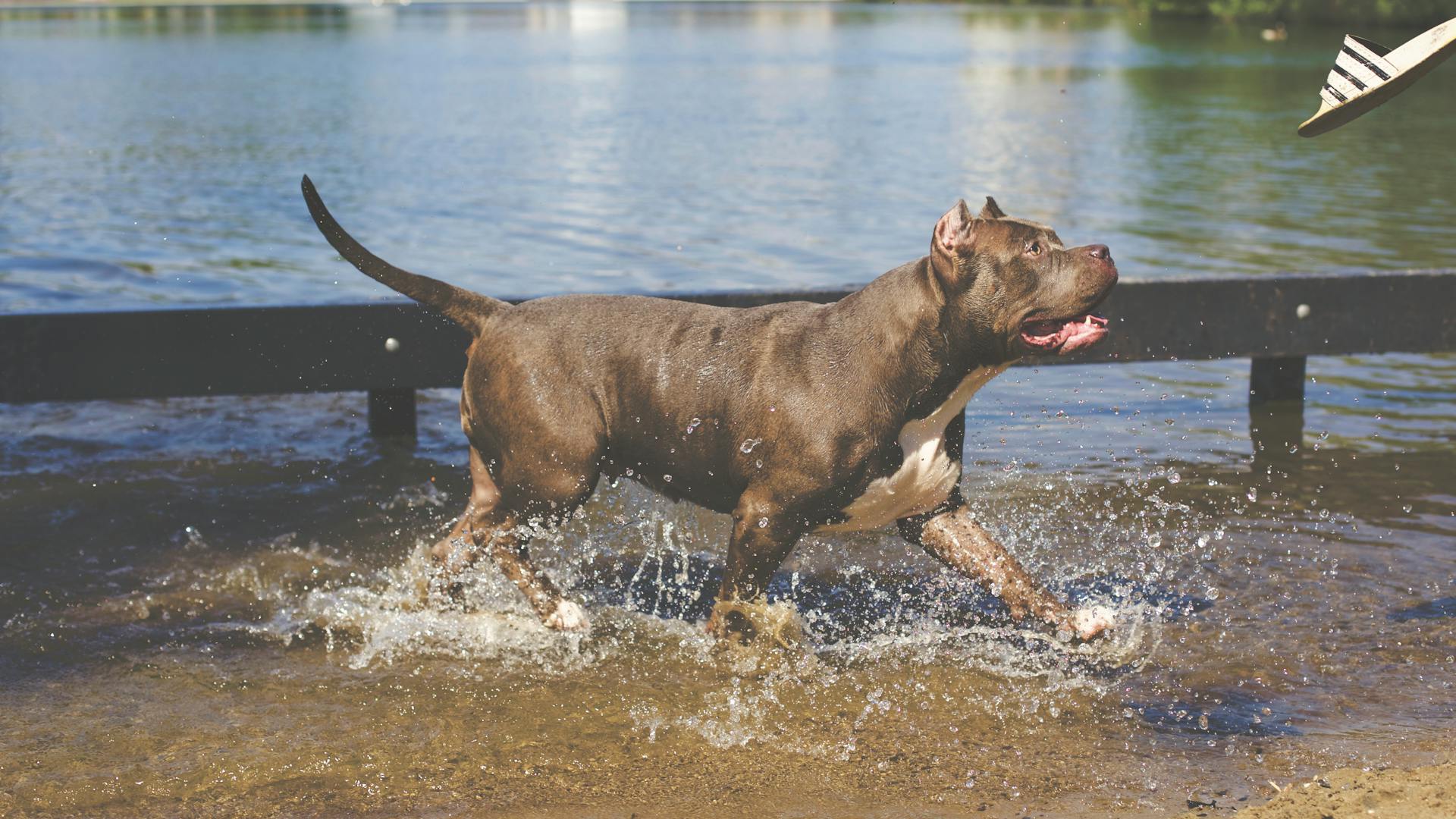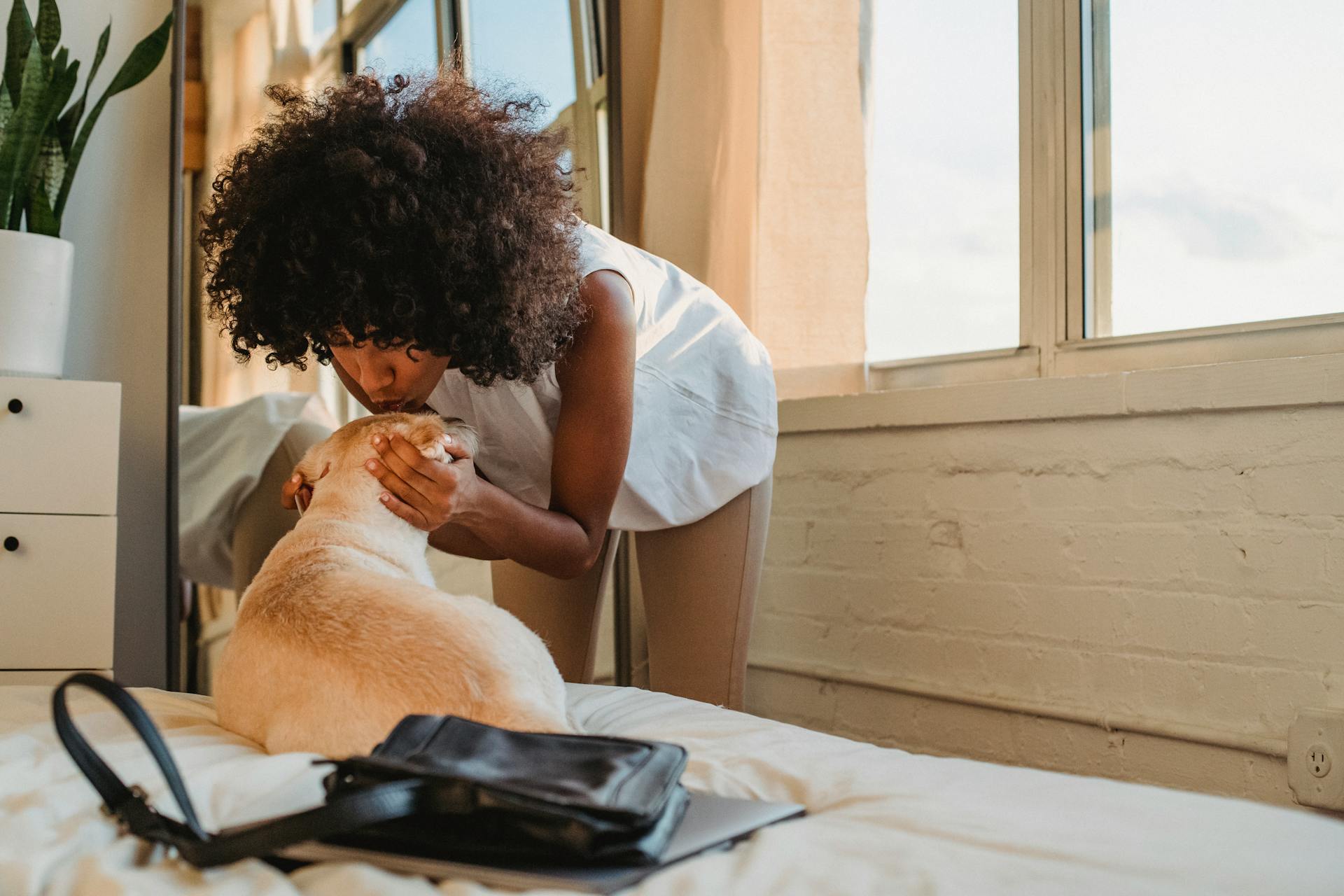
The Pitbull Lab Mix Temperament is a unique blend of the loyalty and affection of a Labrador Retriever with the strength and confidence of a Pitbull. They are often described as a perfect family pet due to their gentle and patient nature.
Pitbull Lab mixes are generally great with children, thanks to their high energy levels and playful personalities, making them ideal for families with kids. They also have a strong instinct to please their owners, which makes training a breeze.
One thing to keep in mind is that Pitbull Lab mixes can be strong-willed at times, requiring consistent and positive reinforcement training. This will help them become well-behaved and obedient companions.
Temperament
The Pitbull Lab Mix temperament is a unique blend of their parent breeds. They can be friendly and love people, but their prey drive can be relatively high, making them have some difficulty getting along with cats and other small animals.
If socialized early, they will likely get along with everyone they meet, including other dogs and kids. However, an early introduction to cats can prevent them from treating them as prey animals.
Pitbull Lab Mixes are often intelligent and people-pleasing, making them easy to train. They will often do what you want them to do quite easily, but they do best in an active family that will tire them out. Without proper exercise, their excitability might cause them to accidentally injure someone.
Parent Breeds
The Temperament of the Labrabull: What Makes Them Tick?
Labrador Retrievers are known for their friendly nature, intelligence, and gentleness, making them a popular choice as family dogs.
The American Pitbull Terrier, on the other hand, has a somewhat formidable reputation due to their strength and power, but in reality, they are gentle and loving dogs.
The combination of these two breeds creates a unique mix of traits in the Labrabull, including intelligence, loyalty, and a wonderful gentleness.
Here are some key characteristics of the parent breeds that influence the temperament of the Labrabull:
This mix of traits creates a loyal and energetic companion that thrives on interaction and exercise.
They Make Good Guard Dogs
They make good guard dogs. The Pitbull Labrador Retriever mix can be an excellent addition to a family's security, thanks to their Pitbull heritage. In fact, they can be so intimidating that would-be intruders think twice. Their strong appearance and fearless nature make them a formidable guardian.
According to some experts, the Pitbull is a naturally protective breed. And when combined with the Labrador's friendly nature, you get a dog that's both loyal and watchful. This mix can be a great asset for families who want a pet that's both loving and protective.
However, it's essential to remember that proper training and socialization are key to unlocking their full potential as guard dogs. If not trained correctly, they might not be as effective in this role. But with the right guidance, they can become a valuable member of your family's security team.
Exercise and Health
Labrabulls are high-energy dogs that require regular exercise to stay happy and healthy. They need at least 1 hour of exercise per day, but more is better.
To prevent unwanted behaviors like excessive chewing, barking, and aggression, make sure to provide your Labrabull with plenty of physical and mental stimulation. This can include long walks, runs, hikes, and playtime in the yard.
Labrabulls are intelligent dogs that thrive on mental challenges, so be sure to include puzzle toys, games, and agility training in their routine.
Some common health issues that can affect Labrabulls include hip and elbow dysplasia, bloat, hypothyroidism, epilepsy, and OCD disorder. Regular veterinary check-ups and genetic testing can help identify these issues early on.
Here are some health issues to watch out for in your Labrabull:
- Allergies
- Obesity
- Skin and ear infections
- Hip and elbow dysplasia
- Bloat
- Hypothyroidism
- Epilepsy
- OCD disorder
Exercise
Labrabulls need a significant amount of exercise to burn off their excess energy. They require at least 1 hour of daily exercise, but more is better, to prevent unwanted behaviors like excessive chewing, barking, and aggression.
A minimum of 30 minutes of vigorous exercise, such as running or playing catch, is essential each day. On top of this, they need 1-2 hours of moderate exercise like walking and playing.
Labrabulls love long walks, runs, and hikes, and they're sure to enjoy water activities thanks to their Lab heritage. They also thrive on mental stimulation, which is just as important as physical exercise.
Puzzle toys and games are great for mental challenges, but they'll love the thrill of agility training or active dog sports. They'll excel at these activities, so be prepared to engage them in regular exercise sessions.
To prevent pent-up energy, Labrabulls need access to a large yard where they can run and play throughout the day. They're not suited for apartment living, as they require space to roam and exercise.
Splitting exercise into at least two sessions a day is recommended, with one session being vigorous and the other moderate. This will help them stay happy and healthy.
Health and Conditions
Exercise and health go hand in hand, and as a dog owner, it's essential to understand how your furry friend's exercise routine affects their overall well-being. Regular exercise can help prevent a range of health issues.

Labrabulls, being a mix of Labradors and Pitbulls, are generally healthy animals, but like all dogs, they can be prone to certain health issues. These include allergies, obesity, skin and ear infections, hip and elbow dysplasia, bloat, hypothyroidism, epilepsy, and OCD disorder.
Regular exercise can help prevent obesity, a common health issue in Labrabulls. Obesity can lead to a range of other health problems, including diabetes, arthritis, and heart disease.
Here's a list of health issues to watch out for in your Labrabull:
- Allergies
- Obesity
- Skin and ear infections
- Hip and elbow dysplasia
- Bloat
- Hypothyroidism
- Epilepsy
- OCD disorder
By being aware of these potential health issues, you can take steps to prevent or manage them, ensuring your Labrabull lives a happy and healthy life.
Life Expectancy
The life expectancy of a Pitbull Lab Mix is a crucial factor to consider when deciding to bring one home. The average lifespan of a Labrador Retriever is 10 to 12 years.
Pitbulls, on the other hand, can live up to 15 years. This means that a Pitbull Lab Mix can potentially live for 10 to 15 years as well.
Regular exercise is essential to maintaining a healthy life for your Pitbull Lab Mix. This can help ensure that your furry friend lives a long and happy life.
For another approach, see: Average Lifespan of Lab Mix
Training and Behavior
Training your Pitbull Lab mix requires early positive reinforcement training. This approach helps build trust and prevents aggression.
Both Pitbulls and Labradors are highly trainable and intelligent, making them a joy to work with. They thrive on pleasing their owners and respond well to positive reinforcement.
To avoid issues of aggression, never use harsh punishment during training sessions. This can lead to distrust and potentially aggressive behavior.
These dogs need plenty of love, attention, and mental stimulation to prevent boredom and frustration. Leaving them alone for long periods can result in destructive behavior and a frustrated dog.
Training
Training your Pitbull Lab mix requires early positive reinforcement. This approach is essential because it helps your dog feel comfortable and confident.
Both Pitbulls and Labradors are highly trainable breeds, and their mix is no exception. They thrive on positive reinforcement and are eager to please their owners.
Start training your Labrabull puppy as soon as you bring them home. The earlier you begin, the better they'll respond to instruction.
Harsh punishment during training can lead to issues of distrust and aggression in the future. It's essential to remain calm and patient, even when your pup misbehaves.
Crate training can be an effective way to housebreak your puppy, but make sure to get a crate that's the right size. Starting early in puppyhood will help your pup get used to the crate with minimal protesting.
Attention
These dogs thrive on love and attention, and since they are so intelligent, they also need a lot of mental stimulation.
They need a lot of interaction and playtime to prevent boredom and frustration, which can lead to destructive behavior.
Leaving them alone for long periods of time is not suitable for a Pitbull Lab mix, as they can become restless and aggressive in their need for attention.
If you leave one of these dogs alone for ten hours a day while everyone is at work, you will come home to a lot of destruction and a frustrated dog that may become aggressive in their need for your affection.
With consistent attention and interaction, you can prevent behavioral issues and strengthen your bond with your dog.
Puppies
Labrabull puppies can inherit most of their temperament from either their Labrador or Pitbull parent, so be prepared for either outcome.
Both Labradors and Pitbulls are loving and affectionate animals, and their puppies will likely reflect these traits.
You can never be sure of what combination to expect with a designer breed like the Labrabull.
Their upbringing has a bigger part to play in their personality than the specifics of their breed.
Many of the best parts of their personality are determined by their training and socialization, which is especially important for breeds like the American Pitbull that need a firm hand in training.
Labrabull puppies will likely be intelligent and loyal, just like their parents.
Family and Living
They're great with kids if socialized early, but it's never a certainty, so be prepared to put in the work.
Pitbull Lab mixes need a lot of exercise, so access to a large yard is a must. They're athletic and muscular, and without proper physical activity, they'll get pent-up energy and might even destroy your belongings.
These dogs love to chew, so chew toys are a must-have, and all your other toys should be tough and durable to withstand their playful nipping.
As a family pet, they're generally friendly, gentle, and playful, making them ideal family dogs. Their "nanny dog" history and patient nature with children make them a great fit for families.
But remember, they're large and powerful, so it's essential to exercise caution around small children, especially when they get excited.
Care and Maintenance
To keep your pitbull lab mix happy and healthy, regular exercise is a must. Aim for at least 30 minutes of moderate-intensity exercise per day, such as a brisk walk or playtime in the yard.
This breed needs mental stimulation as much as physical, so be sure to provide plenty of interactive toys and puzzle games to keep them engaged.
A well-balanced diet is essential for your pitbull lab mix's overall health, so feed them a high-quality dog food that meets their nutritional needs.
Regular grooming is also important, including nail trimming, ear cleaning, and brushing their coat to prevent matting.
With proper care and attention, your pitbull lab mix can live a long and happy life, typically ranging from 10 to 14 years.
Purchasing and Rescue
If you're considering bringing a Pitbull Lab mix into your family, it's essential to think carefully about the rehoming process. Rehoming a dog from a shelter is a wonderful endeavor, but you should take into account your other family members' vulnerabilities.
Getting advice from a positive reinforcement based behaviorist is crucial when rehoming a Pitbull Lab mix. This is because their lack of growls could be a result of punishment, not confidence.
Be sure to ask the organization for any information about your pup's history or parent breed health information before making a decision.
Breeders
When choosing a breeder for your Bullador, make sure they provide health clearances for the parents. Good breeders are happy to share this information and answer your questions.
Your breeder should be asking you questions to ensure you're prepared to handle the large, energetic breed.
Ask to see the Pitbull parent to observe their temperament for yourself. Any sign of aggression in the parents is a red flag.
Rescuing a Pit
Rehoming a Pitbull Lab mix from a shelter can be a wonderful endeavor, but it's essential to get advice from a positive reinforcement based behaviorist to ensure a smooth transition.
Your dog's lack of growls could be a result of punishment, not a sign that they're feeling confident.
Take into account your other family members' vulnerabilities when rehoming a Pitbull Lab mix, and ask the organization for any information about your pup's history or parent breed health information.
You'll want to consider the needs of your new furry family member and ensure everyone is on the same page.
Unfortunately, unethical breeding practices go hand in hand with the increase in demand for designer dog breeds, so be sure to do your research and choose a reputable shelter or rescue organization.
Lab-Pit Bull mixes are incredibly friendly with children and will be both careful and protective of them, but never leave small children alone with any dog unsupervised.
These dogs crave to be included in everything the family does and to be the center of attention, so be prepared to make them a part of your daily life.
They may engage in behaviors you consider aggressive or undesirable to assert their dominance over other dogs or household animals, so be patient and consistent with training.
Remember, punishment is not an effective training method for Lab-Pit Bull mixes, and it can lead to frustration rather than learning.
Frequently Asked Questions
Are pit bull mixes aggressive?
While some Pitbull mixes can be aggressive, most are friendly and peaceful due to proper socialization and care. Learn more about what makes a Pitbull mix a great companion.
Are pitbull mixes good family dogs?
Pitbull mixes can make great family dogs with proper training and socialization. With the right care, they can be loving and loyal companions for families.
What is the temperament of a Lab mix?
The Hound Lab mix is generally affectionate, even-tempered, and gentle, but also energetic and curious. With proper attention, it can make a wonderful pet for active owners.
Featured Images: pexels.com


